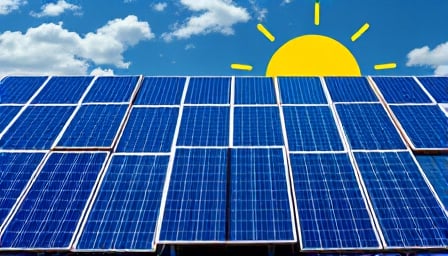First Solar Inc Faces Economic Challenges Amid Tariff Uncertainty
First Solar, Inc., a leading US-based company specializing in the design and manufacture of solar modules using advanced thin film semiconductor technology, has encountered significant economic headwinds due to tariffs. This has notably impacted its stock performance on the Nasdaq, where the company’s shares have seen a sharp decline.
On April 30, 2025, First Solar reported its first-quarter earnings, revealing a disappointing performance that led to a reduction in its annual guidance for 2025. The company cited the impact of tariffs as a primary factor for this adjustment. Despite achieving a modest single-digit revenue growth in the first quarter, the broader economic environment, characterized by on-again, off-again tariff applications and uncertain quantities, has created a challenging landscape for First Solar.
Financial analysts have responded to these developments with a series of downgrades and adjustments to the company’s stock price target. Piper Sandler notably adjusted First Solar’s price target to $200, reflecting concerns over the tariff impact. Similarly, Oppenheimer and Wells Fargo have downgraded the company amid policy uncertainty and tariff concerns, further pressuring the stock.
The market cap of First Solar stands at $14.63 billion, with a close price of $137.24 as of April 28, 2025. The company’s price-to-earnings ratio is 11.35, indicating investor sentiment in light of recent developments. The stock has experienced significant volatility, with a 52-week high of $306.77 and a low of $116.56, underscoring the impact of external economic factors on its performance.
In response to these challenges, First Solar has emphasized its efforts to strengthen production capabilities and explore strategic responses to mitigate the impact of tariffs. During its Q1 2025 earnings call, the company highlighted its commitment to navigating these challenges, despite the dip in earnings and the need to trim its 2025 outlook.
The broader solar module manufacturing industry has also felt the impact of these economic headwinds, with competitors like JinkoSolar facing similar pressures due to weak demand in the US and growing trade barriers. This environment underscores the challenges facing the sector, particularly for companies like First Solar that are navigating the complexities of international trade policies and their implications for the solar energy market.
As First Solar continues to confront these tariff challenges amid efforts to expand production, the company’s strategic direction and financial dynamics remain under close scrutiny by investors and analysts alike. The coming months will be critical for First Solar as it seeks to adapt to an evolving economic landscape and reaffirm its position in the solar energy sector.
